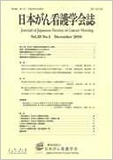Japanese
English
- 販売していません
- Abstract 文献概要
- 参考文献 Reference
- サイト内被引用 Cited by
要旨
研究目的は,初めてがんと診断され手術を受けたがんサバイバーのゆらぎを明らかにすることである.初めてがんと診断され,胃を切除したサバイバー20名を対象に,半構成的面接法にて,がん診断以降の気持ちや体験について調査した.分析は修正版グラウンデッド・セオリー・アプローチを用いて,以下のような結果を得た.
がんサバイバーのゆらぎは【がん罹患と治療で心が打ち拉がれる】という強く激しい揺れの状態から始まるが,その状態に留まるのではなく【がん治癒や回復を目指して最良を尽くす】力,【がん罹患を受け止める心の準備をする】力,【がん治癒への希望を見出す】力を順次動員させ揺れを収束しようとする.しかし,ゆらぎが生じる前の過去の記憶により【がん罹患前の自己への羨望】を生じさせる.〈健康であった過去の自己を羨む〉は,強く激しい揺れに逆戻りする危うさがある反面,〈手術前を目指した回復への願い〉は,揺れを収めようとする力の動員を促進させる.このようにゆらぎは,後戻りや新たなゆらぎが生じるなどスパイラル的な変化の過程である.また,ゆらぎは【命の存在する価値ある時間の意識化】を生じさせ,今を生きることを鮮明にさせ【がん罹患と治療で心が打ち拉がれる】の後に順次動員させる【がん治癒や回復を目指して最良を尽くす】【がん罹患を受け止める心の準備をする】【がん治癒への希望を見出す】【がん罹患前の自己への羨望】を鮮明に浮かび上がらせる.
Our research aims at defining yuragi of patients who have been diagnosed with cancer for the first time and have undergone surgery. We conducted semi-structured interviews with 20 cancer survivors who had undergone a gastrectomy in order to obtain data regarding their feelings and experiences after the cancer diagnosis. The Modified Grounded Theory Approach is used for analysis, and the results are as follows.
Yuragi of cancer survivors started from severe mental turmoil, “being overwhelmed by getting cancer diagnosis and treatment.” However, this was temporary. In order to stabilise their yuragi, they reclaimed their inner strength by first “trying their best to be treated and to recover from cancer,” then by “preparing themselves to face cancer,” and eventually by “finding hope in cancer treatments.” At the same time, they started “becoming envious of themselves before developing cancer,” when they thought about the past before yuragi had developed.
While yuragi involving missing one's previous health conditions presented a risk of reverting the patients back to violent mental agitation, yuragi involving ‘a hope to recover to the previous healthy state' encouraged them to pacify such perturbation. Thus, yuragi as a whole is a spiral change which includes regressions and new indications.
The process of going through various stages of yuragi also let the cancer survivors “realise the value of their remaining time.” This helped the patients to live “in the now.” After “being overwhelmed by getting a cancer diagnosis and treatment,” they experienced the stages of yuragi mentioned above, which were “trying their best to be treated and to recover from cancer,” “preparing themselves to face cancer,” “finding hope in cancer treatments,” and “becoming envious of themselves before developing cancer.” Therefore we conclude that each stage of yuragi accentuates every emotional shift patients have to go through.
Copyright © 2016, Japanese Society of Cancer Nursing All rights reserved.


